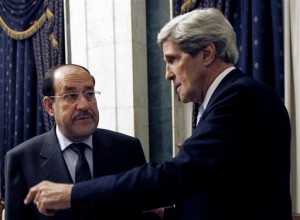 The U.S. has inserted 200 troops in Iraq since 2012, but they cannot directly help the Iraqi military repel a surge of al Qaeda fighters, even as the country succumbs to sectarian violence and insurgents claim control of two key cities.
The U.S. has inserted 200 troops in Iraq since 2012, but they cannot directly help the Iraqi military repel a surge of al Qaeda fighters, even as the country succumbs to sectarian violence and insurgents claim control of two key cities.
On Sunday, at least 20 people were killed in bombings in Baghdad and 34 others in fighting in the western province of Anbar, where Iraqi troops were trying to oust insurgents who had laid claim to the cities of Ramadi and Fallujah.
In Jerusalem on a Middle East peace mission, Secretary of State John F. Kerry said the U.S. supports Baghdad’s battle against al Qaeda but will not commit American troops to the fight. Nearly all U.S. troops withdrew from Iraq in December 2011.
“This is a fight that belongs to the Iraqis. That is exactly what the president and the world decided some time ago when we left Iraq, so we are not obviously contemplating returning. We are not contemplating putting boots on the ground. This is their fight,” Mr. Kerry said. “We will help them in their fight, but this fight, in the end, they will have to win and I am confident they can.”
The 200 U.S. service members in Iraq are part of the Office of Security Cooperation-Iraq, which was set up two years ago this month to spearhead military aid to Baghdad in terms of manpower and weapons.
“OSC-I is responsible for conducting non-operational training with Iraqi Ministry of Defense and Counter-Terrorism Service personnel,” said Army Lt. Col. Chris Belcher, a spokesman for U.S. Central Command, which oversees operations in the Middle East. “Non-operational training means they can’t go into the field and train the Iraqis.”
“That would not be enough,” said retired Army Gen. John Keane, an architect of the 2007 U.S. troop surge that reduced violence in Iraq by 90 percent and led to the military exodus ordered by President Obama in 2011.
Since then, Iraqi defense forces, schooled for years by Americans in how to conduct precision counterterrorism strikes, have been unable to contain al Qaeda. Tensions between Sunni and Shiite Muslims have given rise to violence that has killed thousands of Iraqis in recent months. Al Qaeda-linked insurgents, who are mostly Sunni, have taken advantage of the chaos to try to undermine the Shiite-led government of Iraqi President Nouri al-Maliki.
Gen. Keane said it is time to station American military advisers at divisional headquarters in Iraq where they could preach to commanders tactics for finding and striking al Qaeda and Sunni militants.
Gen. Keane and others who fought in Iraq are watching their gains slip away. “We’re creeping right back to where the situation was at the beginning of the surge in 2007,” he said. “We’re not quite there yet, but we’re getting close.
“What we could do to help them is some advisers at the major headquarters to provide some advice to them in terms on what the strategy should be and the tactics should be,” he said. “We’re not talking about returning troops again. That’s not going to be politically viable.”
Gen. Keane, who was Army vice chief of staff and a key adviser to the George W. Bush administration on how to defeat the insurgency, said Mr. al-Maliki’s government has returned to its old way of operating.
“We trained them an awful lot on how to do this, but the fact of the matter is they have ignored in the past a lot of our counterinsurgency practices by simply posting checkpoints along roads and being considerably more defensive than what you need to be in terms of a protect-the-population counterinsurgency strategy, which is what they will need to do to gain the momentum back. That’s going to be critical for them,” he said.
Mr. al-Maliki, who was in Washington last fall, has pressed Obama aides to speed up the delivery of attack helicopters, surveillance drones and air-to-ground missiles. Iraq is scheduled to receive 36 F-16 fighter jets this fall.
Activity of the U.S. troops in Iraq is legally restricted.
washington times
Photo: U.S. Secretary of State John Kerry, right meets with Iraq’s Prime Minister Nouri al-Maliki in Baghdad, Iraq, Sunday, March 24, 2013. Commenting on the fight between the Iraqi forces and Al Qaeda Kerry said on Sunday January 5, 2014 : “This is a fight that belongs to the Iraqis. That is exactly what the president and the world decided some time ago when we left Iraq, so we are not obviously contemplating returning.(AP Photo/Jason Reed, Pool)

Leave a Reply
You must be logged in to post a comment.